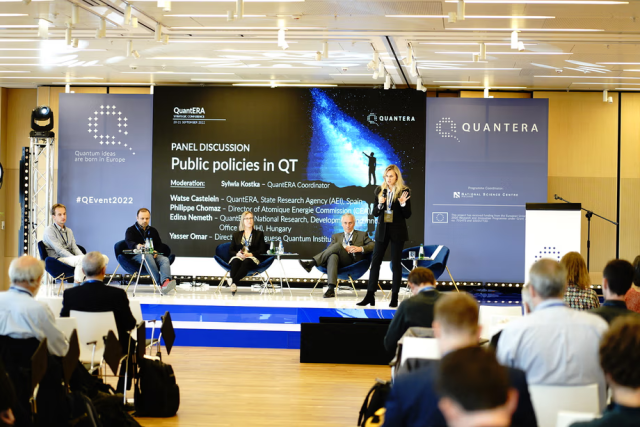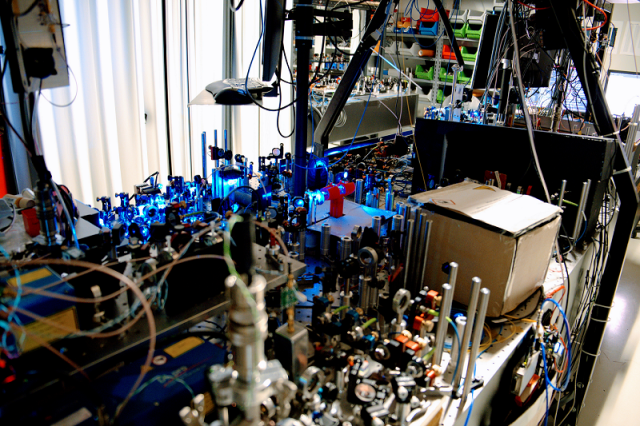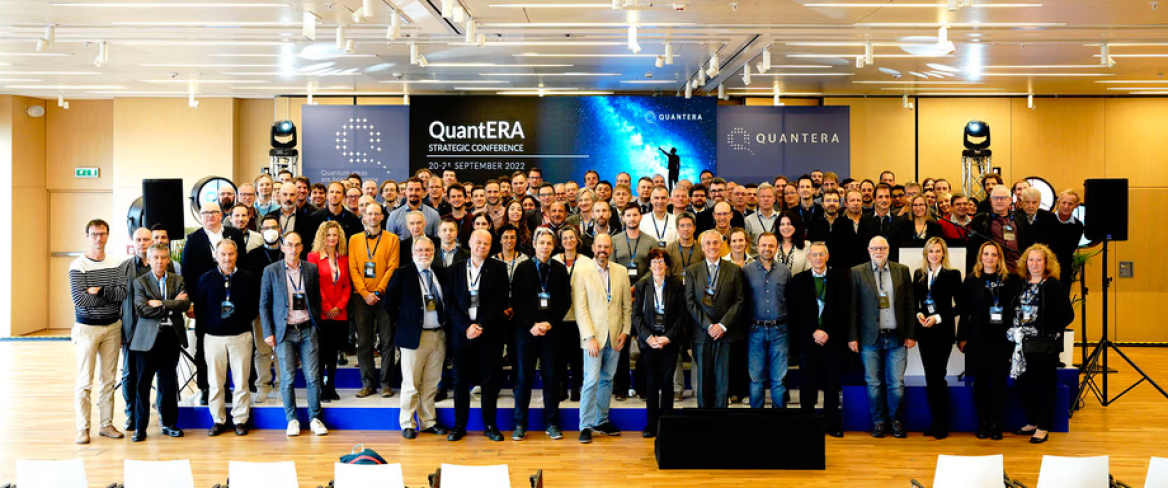Medical diagnostics will be faster and more accurate, online data security will get incomparably better and we already see the advent of new materials with properties that are nothing short of revolutionary. Scientists predict the development of quantum technologies will redefine our reality within the next ten to twenty years.
Today, the world is witnessing a rapid growth in these technologies, and Europe wants to become its first “Quantum Valley”. With their impressive record of foundational research and increasing focus on experimental results, Polish researchers are among some of the leading scientists in the field. Poland is also the coordinator of QuantERA, the largest European quantum research-funding network. Now, researchers are hoping Poland will soon adopt a long-term quantum technology development strategy modelled on programmes already in place in other countries.
First Quantu
 QuantERA Strategic Conference, Kraków 2022 | Photo by Błażej Górczyński
m Valley
QuantERA Strategic Conference, Kraków 2022 | Photo by Błażej Górczyński
m Valley
Five years ago, the European Union started one of the most important endeavours in the field of research and innovation: the Quantum Technologies Flagship, with a budget of more than a billion, designed to put Europe at the forefront of quantum technology development. In December 2023, 15 states adopted the European Declaration on Quantum Technologies; the signatories to the agreement included, e.g. Denmark, Finland, Germany and Sweden, but also Central European countries such as Hungary and Romania. They underscored the strategic importance of quantum technologies for the scientific and industrial competitiveness of the EU and committed to working together to turn Europe into the global leader for quantum excellence and innovation.
Last month, representatives of the Quantum Technologies Flagship presented a new quantum development agenda 2030, in which they defined their ultimate goal as turning Europe into the world’s first “Quantum Valley” thanks to its scientific and industrial potential, qualified workforce and multi-billion investments. “Many concepts and ideas in quantum technology were born on our continent”, says Prof. Konrad Banaszek, a world-renowned expert in the field, winner of the MAB programme of the Foundation for Polish Science and author of multiple articles and patent applications.
The largest network with a seat in Poland
Prof. Konrad Banaszek is the scientific coordinator of the QuantERA funding initiative, the largest European programme developed to support quantum technology research, which works in close cooperation with the Quantum Flagship.
The QuantERA Network promotes and funds ambitious, foundational and cutting-edge engineering research projects in quantum technologies (QT), supports collaboration between researchers and research-funding agencies, monitors public policies and strategies in quantum technologies, and creates responsible research guidelines. The network brings together 41 research-funding agencies from 31 countries. Poland plays a key role within the organisation, as the network is coordinated by the National Science Centre. “We are well aware of what’s going on in quantum technologies, we know what projects are underway in Europe at the moment and, most importantly, we can influence the directions of development in the field”, comments Sylwia Kostka, the programme’s coordinator.
Since its establishment in 2016, one of the members of the Strategic Advisory Board of the network has been Prof. Alain Aspect, who, alongside Profs. John Clauser and Anton Zeilinger, won the Nobel Prize for pioneering quantum information research in 2022. Poland is represented on the board by Prof. Marek Żukowski from the University of Gdańsk, a long-time collaborator of Prof. A. Zeilinger’s.
Thus far, QuantERA has funded more than 100 international basic and applied research projects carried out by nearly 550 research teams. In the last call, concluded at the end of 2023, the highest-ranked proposals included research into quantum imaging, colour-centre quantum sensors and quantum-dot single-photon sources.
Scientists from Polish research centres have been involved in nearly 40 of the projects funded by the network. “The fact that the NCN is its coordinator has placed us right at the centre of things and contributed to the promotion of the Polish quantum community”, says Dr Radek Łapkiewicz, Head of the Quantum Optics Lab at the University of Warsaw. Łapkiewicz studies how quantum effects can be used in imaging; he earned his PhD degree in Vienna, working with a team led by Prof. Anton Zeilinger, and specialised in experiments with entangled photons. In the 2023 QuantERA call, he won a grant for his applied research project entitled Quantum Multi-Modal Microscopy, which he will be working on with his collaborators from France, Germany and Switzerland.
When asked what changes quantum technologies may bring to imaging in the nearest future, Dr Łapkiewicz says that it would be only natural to use quantum instruments to move the frontiers of what can be done in biomedical imaging. “Advanced biomedical imaging is often limited by the amount of light available. For instance, if you want to look at the structures deep inside a tissue, it is often difficult to introduce enough light there in a non-invasive way and it is just as hard to detect the light coming out. Quantum optics scientists specialise in detecting even very weak light pulses, while quantum metrologists know how to plumb each photon for maximum information”, he explains, and then adds that the scientific community has already witnessed the first demonstrations of the quantum advantage and is now focused on trying to “find applications in imaging, where quantum technologies will prove the most useful”.
Dr inż. Anna Musiał from the Wrocław University of Technology heads the FiGanti project, bringing together scientists from Finland, Sweden, France and Germany. Working with an international consortium, she emphasises, allows her to explore the potential of her partners and contributes to boosting the recognisability of her university. “A good joint project is a very important boost to how a centre is perceived in Europe and the best form of advertising. Importantly, it is also an opportunity to exchange experiences when it comes to research, lab organisation and team work”, says Musiał.
 Centre for Quantum Optical Technologies, University of Warsaw
Outstanding achievements since the 1990s
Centre for Quantum Optical Technologies, University of Warsaw
Outstanding achievements since the 1990s
Polish scientists have had an outstanding track record in terms of foundational research. A lot of theoretical work on quantum entanglement was done in the 1990s at the University of Gdańsk, where Prof. Ryszard Horodecki and his team built a lab that soon became the world’s chief centre of quantum information technology research. Research institutions in Warsaw and Kraków have had a long tradition of research into quantum optics, the springboard for most current research into new means of communication, detection, metrology and imaging. Scientists from the Nicolaus Copernicus University in Toruń work at the FAMO Laboratory to develop next-generation optical atomic clocks, the world’s most precise time measurement devices, which can be used in geodesy and navigation. They also work on other quantum metrology applications.
Besides theory, Polish labs are also producing more and more experimental results. Last year, a team led by Dr hab. Michał Parniak from the Centre for Optical Quantum Technologies at the University of Warsaw, constructed a device that can convert quantum information between single microwave and optical photons. This device may become an infrastructure element for a quantum internet and find new applications in microwave radio astronomy. Also last year, another group, led by Dr Michał Karpiński from the Quantum Photonics Lab of the same university, developed a new technique of quantum information transfer that is several dozen times faster. Both inventions have opened up new technical avenues and the research results in question were published in a prestigious journal, Nature Photonics.
“All our research centres have enormous potential, as evidenced by their participation in European projects, publications, their awards, patents and industrial contacts”, estimates Prof. Konrad Banaszek.
The Polish quantum community is also tightening its internal cooperation. In May 2022, on the initiative of Prof. Banaszek, nearly 20 research institutions and economic entities set up Cluster Q – a Quantum Technologies Cluster, which now consists of nearly 30 members. The mission of the cluster is to develop quantum technology research and lend scientific and practical support to the entire Polish quantum industry.
Austria invests resources. Hungary starts a second quantum program
The “Quantum Technologies Public Policies, 2023” report, published by QuantERA, concludes that most European countries already recognise the potential benefits of quantum technologies and invest significant resources in developing their competitive advantage. Just three years earlier, only a few out of the 29 countries in the network had put national quantum technology development programmes in place. Today, most countries already have a strategy or at least a set of priorities, and five (Austria, Denmark, Spain, Sweden, Switzerland) have slated significant domestic resources for the development of quantum technologies.
A lot of activity in this area can also be observed in the countries of Central and Eastern Europe. Hungary has already developed its second domestic quantum technologies programme. Slovakia has set up a national centre, QUTE, designed to prepare the country for the quantum industry. Latvia has adopted a national strategy and developed the Latvian Quantum Initiative, which brings together scientists working in the field.
Poland is not a signatory to the European Declaration on Quantum Technologies of December 2023. Nor does it have a national strategy. “We have all the assets in hand, but we need a political decision to consolidate the idea that quantum technologies are a priority”, says Sylwia Kostka. Scientists hope that the document will be adopted in the nearest future. They have already held initial talks with representatives of the government which, the NCN coordinator argues, “could provide an impulse for further action”. The push for a strategy was initiated by Cluster Q.
“Defining long-term goals will help organise and integrate currently-scattered activities. For me, what matters is that everyone realises quantum technologies are an important domain that needs to be supported in the long term”, says Dr Anna Musiał.
If adopted, the programme would be a huge opportunity for the development of science, business and the economy.
Anna Korzekwa-Józefowicz

QuantERA Strategic Conference, Kraków 2022 | Photo by Błażej Górczyński
